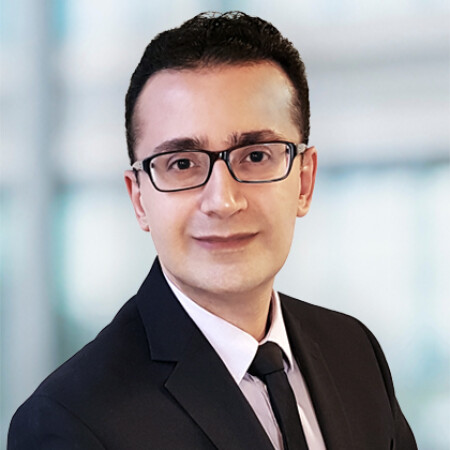PhD - Communication Sciences and Disorders
Northwestern University - 2011

Roozbeh Behroozmand
Associate Professor - Department of Speech, Language, and Hearing
Research Interests: Neuroscience of speech production and sensorimotor control with focus on identifying behavioral, neurophysiological (EEG), and neuroimaging (fMRI) biomarkers of speech disorders in neurological conditions including Parkinson's disease and post-stroke aphasia.
972-883-3062
CR 1.340
Speech Neuroscience Lab
Curriculum Vitae
Google Scholar
ORCID
Currently accepting graduate students
Professional Preparation
MSc - Biomedical Engineering
Amirkabir University of Technology - 2006
Amirkabir University of Technology - 2006
BSc - Electrical Engineering
University of Tehran - 2003
University of Tehran - 2003
Research Areas
Neuroscience of Speech Production and Motor ControlNeural Processing of Speech Auditory Feedback
Neurological Bases of Speech Motor Disorders
Neurophysiology and Neuroimaging (EEG, fMRI)
Brain Stimulation for Speech and Voice Therapy
Signal Processing and Computational Modeling
Publications
Nejati V, Vaziri Z, Antal A, AntonenkoD, Behroozmand R, et al. Report Approval for Transcranial Electrical Stimulation (RATES): Expert Recommendation based on a Delphi Consensus Study. Nature Protocols 2025 - publications
Nejati V, Daliri A, Behroozmand R. Neural Mechanisms of Articulatory Motor Speech Deficit in Post Stroke Aphasia: An ERP Study. Neuroimage 2025 - publications
Savareh Sonj S, Torabinezhad F, Saffarian A, Abolghasemi J, Behroozmand R. Top-Down Modulation of Auditory-Motor Integration in Individuals with Primary Muscle Tension Dysphonia: The Role of Auditory Working Memory. Journal of Voice 2025 - publications
Nejati V, Sarraj Khorrami A, Khosravi M, Behroozmand R. A meta-analysis of NIBS studies on verbal fluency. Neuroscience 2025 - publications
Suchy D, Behroozmand R, Railo H. Conscious and unconscious perception of errors in auditory feedback during vocalization: Behavioral functions and event-related potential correlates. Neuroimage 2025 - publications
Sarmukadam K, Nejati V, Behroozmand R. Effective Neural Connectivity Deficits during Speech Auditory Feedback Processing in Post-Stroke Aphasia: An fMRI Study. Cortex 2025 - publications
Zhang Y, Sarmukadam K, Nejati V, Behroozmand R. Functional Neural Oscillatory Activities Reveal the Impact of Attentional Instructions on Speech Auditory Feedback Control. Neuropsychologia 2025 - publications
Behroozmand R, Mollasaraei ZK, Nejati V, Daliri A, Fridriksson J. Vocal and Articulatory Speech Control Deficits in Individuals with Post-stroke Aphasia. Scientific Reports 2025 - publications
Awards
Recognition of Outstanding Achievements in Research (ROAR) Award - Office of Research and Innovation, University of Texas at Dallas [2025]
The Breakthrough Star Award - Office of the Vice President for Research, University of South Carolina [2023]
Distinguished Research Service Award - Office of the Vice President for Research, University of South Carolina [2023]
AHSA Grant Review and Reviewer Training Travel Award - American Speech Language Hearing Association [2019]
AHSA Grant Review and Reviewer Training Travel Award - American Speech Language Hearing Association [2018]
ASHA Lessons for Success Travel Award - American Speech Language Hearing Association [2017]
Young Scientists Scholarship and Travel Award - Neuroinformatics Advanced Research Training Program, Marine Biological Laboratories [2012]
ASHA Meritorious Poster Recognition Award - American Speech Language Hearing Association [2012]
Joseph Levin Foundation Scholarship for Advanced Doctoral Studies in Communication Sciences and Disorders - Northwestern University [2010]
Top Student Award for Highest Academic Achievements - Department of Biomedical Engineering, Amirkabir University of Technology [2006]
Appointments
Associate Professor
Department of Speech Language and Hearing, School of Behavioral and Brain Sciences, The University of Texas at Dallas [2023–Present]
Department of Speech Language and Hearing, School of Behavioral and Brain Sciences, The University of Texas at Dallas [2023–Present]
Associate Professor
Department of Communication Sciences and Disorders, Arnold School of Public Health, University of South Carolina [2020–2023]
Department of Communication Sciences and Disorders, Arnold School of Public Health, University of South Carolina [2020–2023]
Assistant Professor
Department of Communication Sciences and Disorders, Arnold School of Public Health, University of South Carolina [2014–2020]
Department of Communication Sciences and Disorders, Arnold School of Public Health, University of South Carolina [2014–2020]
Post-doctoral Research Scholar
Human Brain Research Lab, Carver College of Medicine, University of Iowa [2011–2014]
Human Brain Research Lab, Carver College of Medicine, University of Iowa [2011–2014]